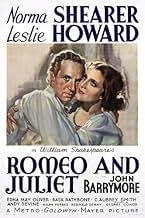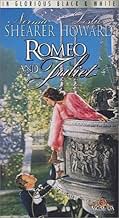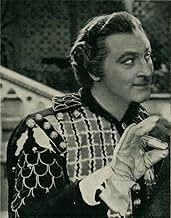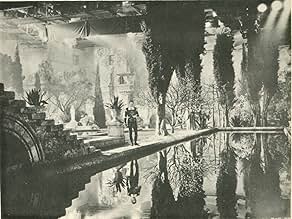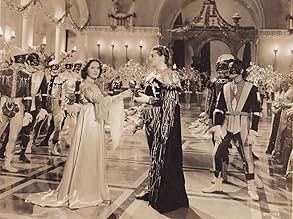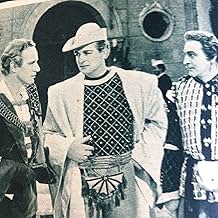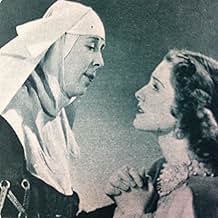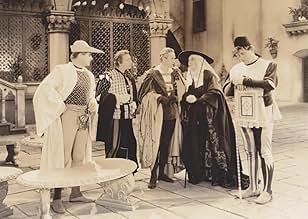NOTE IMDb
6,4/10
2,4 k
MA NOTE
Ajouter une intrigue dans votre langueYoung love is poisoned by a generations long feud between two noble families.Young love is poisoned by a generations long feud between two noble families.Young love is poisoned by a generations long feud between two noble families.
- Réalisation
- Scénario
- Casting principal
- Nommé pour 4 Oscars
- 4 victoires et 5 nominations au total
Charles Bancroft
- Nobleman
- (non crédité)
Dean Benton
- Minor Secondary Role
- (non crédité)
Carlyle Blackwell Jr.
- Tybalt's Page
- (non crédité)
John Bryan
- Friar John
- (non crédité)
Avis à la une
The fine cast and production make this adaptation of "Romeo & Juliet" a satisfying one, both as a movie and as a realization of Shakespeare's play. Most of the cast is matched up very well with their characters, and the lavish settings provide a good backdrop for the drama.
Although it's soon clear that Leslie Howard and Norma Shearer are quite a bit older than the original characters were, in other respects they are well cast. Shearer's eager innocence and Howard's refinement fit together well, and although they are clearly not the teenage characters of the original, their romance is believable and convincing in itself.
The other roles include some nice casting. Reginald Denny as the loyal Benvolio, Basil Rathbone as the hard-hearted Tybalt, and Edna May Oliver as Juliet's bustling nurse are all enjoyable to watch. But the highlight of the cast is John Barrymore, who steals every scene as the fun-loving, ill-fated Mercutio, a character who is well-suited to Barrymore's strengths. It's a blessing that at least one of Barrymore's numerous Shakespearean roles was captured in a film for posterity.
The script abridges many of the scenes for cinematic purposes, and it does well in fleshing out the basic story with the duels, festivities, and other events, at times also dramatizing developments that in the original text are only mentioned by the characters. Overall, it is a well-conceived, well-executed, and enjoyable movie version of the famous story.
Although it's soon clear that Leslie Howard and Norma Shearer are quite a bit older than the original characters were, in other respects they are well cast. Shearer's eager innocence and Howard's refinement fit together well, and although they are clearly not the teenage characters of the original, their romance is believable and convincing in itself.
The other roles include some nice casting. Reginald Denny as the loyal Benvolio, Basil Rathbone as the hard-hearted Tybalt, and Edna May Oliver as Juliet's bustling nurse are all enjoyable to watch. But the highlight of the cast is John Barrymore, who steals every scene as the fun-loving, ill-fated Mercutio, a character who is well-suited to Barrymore's strengths. It's a blessing that at least one of Barrymore's numerous Shakespearean roles was captured in a film for posterity.
The script abridges many of the scenes for cinematic purposes, and it does well in fleshing out the basic story with the duels, festivities, and other events, at times also dramatizing developments that in the original text are only mentioned by the characters. Overall, it is a well-conceived, well-executed, and enjoyable movie version of the famous story.
The Adrian (and Messell) costumes are magnificent. The sets & cinematography are beautifully realized & director George Cukor does the best he can with what he has been given but the absurd casting of actors 20 years, or more, too old cannot be ignored. Juliet is supposed to be around 13 & Norma Shearer is in her mid 30s. Romeo is to be approximately 16. Leslie Howard is in his mid 40s. The foolish, romantic & tragic path taken by Romeo & Juliet is because of their youth. With these 2 way too old actors, it makes the characters behave as if they are developmentally challenged. It is not how adults behave. I'm am not a student of Shakespeare but I've read the play. Many necessary cuts were made to the text in order to get it to the screen or it would've ended up being over 4 hours long. I don't complain of these cuts. I don't complain of the line readings by some actors. I respect how the studio & Thalberg put the money & attention to detail into the production. Accomplished Shakespearean acting coaches were brought in to get the best performances from the actors. I believe Norma Shearer worked hard to do her best but oh my. She is not Juliet. Leslie Howard is ok but both wouldve been better cast as Lord and Lady Montague or Lord and Lady Capulet. It is a lush & lavish production. I can admire it as a beautiful elegant bauble. If I don't pay close attention to the actors, I can enjoy the spectacle but I cannot accept Shearer & Howard as the lead characters. It's a distraction I cannot pretend isn't there. That they are too old is a valid reason to critique the movie harshly.
Despite the fact we have a 47 year old Romeo, a 36 year old Juliet, and a 54 year old Mercutio; George Cukor's production for MGM of Romeo and Juliet manages to entertain and well.
Of course these protagonists are all teenagers, but these players have all played romantic parts in an age when romance was not something to be cynical about and they do fit their roles well. No Romeo was ever more dashing than Leslie Howard or a Juliet as passionate as Norma Shearer.
John Barrymore as Mercutio is a bit of an exception. I look at him and I think of another Shakespearean character who simply doesn't want to grow up and spends his time with the young blades of his day at the tavern. That would be Falstaff in Henry IV in both parts and if you think of Barrymore's Mercutio in that way, his interpretation makes a lot of sense.
My favorite in this film has always been Tybalt and Basil Rathbone plays him with fire and passion. Rathbone got an Academy Award nomination, the first of two, for Best Supporting Actor in the first year Supporting Actor Awards were given out. He lost however to Walter Brennan in Come and Get It. He's just spoiling for a fight with some Montagues and in the end he unfortunately gets one.
Romeo and Juliet is insightful into the Italy of the times. Italy was a geographical expression not a nation. In fact it was ruled mostly by the German entity, the Holy Roman Empire. But inside the empire and out it was a succession of petty states, constantly at war with each other. Sometimes the causes of the wars were long forgotten, but the hostilities took on a life of their own.
Right down to a couple of wealthy families in the small town of Verona where the prince there has his hands full trying to keep the Montague and Capulet feud from spilling over into violence every time some of them meet in his town.
With this background a young prince of Montague just getting over another bad romance and a princess of Capulet whose father has her slated to marry another meet and fall in love. Even when they find out their respective pedigrees, it makes no difference.
In fact the idea that love can bridge all barriers is what I believe makes Romeo and Juliet as popular as it is. It's a lesson people and nations could learn.
Norma Shearer got an Oscar nomination for playing Juliet, but lost to Luise Rainer in The Great Ziegfeld as Best Actress. George Cukor and the film itself also were up, but lost for best director and best picture.
Andy Devine plays the small part of Peter, a Capulet servant and I'm sure you're wondering what Andy Devine was doing in Shakespeare. So did he when he was cast in the part. The story goes that he went to George Cukor and told him he hadn't foggiest idea what he was doing in a classic Shakespeare play, he'd never done anything like this. Cukor supposedly told him, that was to his credit and that he would be the only member of the cast who would not be telling him how to direct the film. Turned out Cukor was right, but the film got made.
And that's definitely for the better.
Of course these protagonists are all teenagers, but these players have all played romantic parts in an age when romance was not something to be cynical about and they do fit their roles well. No Romeo was ever more dashing than Leslie Howard or a Juliet as passionate as Norma Shearer.
John Barrymore as Mercutio is a bit of an exception. I look at him and I think of another Shakespearean character who simply doesn't want to grow up and spends his time with the young blades of his day at the tavern. That would be Falstaff in Henry IV in both parts and if you think of Barrymore's Mercutio in that way, his interpretation makes a lot of sense.
My favorite in this film has always been Tybalt and Basil Rathbone plays him with fire and passion. Rathbone got an Academy Award nomination, the first of two, for Best Supporting Actor in the first year Supporting Actor Awards were given out. He lost however to Walter Brennan in Come and Get It. He's just spoiling for a fight with some Montagues and in the end he unfortunately gets one.
Romeo and Juliet is insightful into the Italy of the times. Italy was a geographical expression not a nation. In fact it was ruled mostly by the German entity, the Holy Roman Empire. But inside the empire and out it was a succession of petty states, constantly at war with each other. Sometimes the causes of the wars were long forgotten, but the hostilities took on a life of their own.
Right down to a couple of wealthy families in the small town of Verona where the prince there has his hands full trying to keep the Montague and Capulet feud from spilling over into violence every time some of them meet in his town.
With this background a young prince of Montague just getting over another bad romance and a princess of Capulet whose father has her slated to marry another meet and fall in love. Even when they find out their respective pedigrees, it makes no difference.
In fact the idea that love can bridge all barriers is what I believe makes Romeo and Juliet as popular as it is. It's a lesson people and nations could learn.
Norma Shearer got an Oscar nomination for playing Juliet, but lost to Luise Rainer in The Great Ziegfeld as Best Actress. George Cukor and the film itself also were up, but lost for best director and best picture.
Andy Devine plays the small part of Peter, a Capulet servant and I'm sure you're wondering what Andy Devine was doing in Shakespeare. So did he when he was cast in the part. The story goes that he went to George Cukor and told him he hadn't foggiest idea what he was doing in a classic Shakespeare play, he'd never done anything like this. Cukor supposedly told him, that was to his credit and that he would be the only member of the cast who would not be telling him how to direct the film. Turned out Cukor was right, but the film got made.
And that's definitely for the better.
For years, I put off watching this version of Shakespeare's classic love story, knowing that all the main players were about thirty years too old for their roles. Finally, when the film came on late on night, I decided to take a look, because I do admire the work of so many of the players.
Provided you can put aside the problems of the ages of the actors, the result is a very pleasant surprise. The biggest surprise for me was the performance of Norma Shearer - I've always liked her work, but considered her rather lightweight for Shakespeare. Not so - she delivered her lines with a great feel for the style and pace, and was as delightful and open a Juliet as one could wish. Her age became irrelevant; this was a young girl new to love, completely swept off her feet and ready to surrender all - for the first time.
Leslie Howard was also comfortable with the Shakespearean dialogue, if slightly lacking the boyish passion we rightly expect to see. He was more the slightly older suitor, taken by surprise with the fresh appeal of his Juliet, but ready to cast aside previous attachments to pursue and win her. His lovely voice delivered the lines with ease and fluency.
John Barrymore's Mercutio was much more the ageing playboy than the dashing young blade, but his sure touch with the dialogue showed clearly why he was considered the preeminent Shakespearean actor of his day in America. His delivery of the "Queen Mab" speech was a delight. His body was way too old, but his spirit lacked nothing.
Flora Robson came near to stealing most of her scenes, as she so often did, and Basil Rathbone was fully at home in the role of Tybalt; fine performances from these two, as we would expect from their backgrounds.
It was, to my mind, rather over-produced, with the actors in danger of being lost in the expansive sets, but remembering that had these actors been performing on stage, we wouldn't bat an eyelid at their ages, they provide us with an engrossing experience and deliver a play that even the experts couldn't fault.
Provided you can put aside the problems of the ages of the actors, the result is a very pleasant surprise. The biggest surprise for me was the performance of Norma Shearer - I've always liked her work, but considered her rather lightweight for Shakespeare. Not so - she delivered her lines with a great feel for the style and pace, and was as delightful and open a Juliet as one could wish. Her age became irrelevant; this was a young girl new to love, completely swept off her feet and ready to surrender all - for the first time.
Leslie Howard was also comfortable with the Shakespearean dialogue, if slightly lacking the boyish passion we rightly expect to see. He was more the slightly older suitor, taken by surprise with the fresh appeal of his Juliet, but ready to cast aside previous attachments to pursue and win her. His lovely voice delivered the lines with ease and fluency.
John Barrymore's Mercutio was much more the ageing playboy than the dashing young blade, but his sure touch with the dialogue showed clearly why he was considered the preeminent Shakespearean actor of his day in America. His delivery of the "Queen Mab" speech was a delight. His body was way too old, but his spirit lacked nothing.
Flora Robson came near to stealing most of her scenes, as she so often did, and Basil Rathbone was fully at home in the role of Tybalt; fine performances from these two, as we would expect from their backgrounds.
It was, to my mind, rather over-produced, with the actors in danger of being lost in the expansive sets, but remembering that had these actors been performing on stage, we wouldn't bat an eyelid at their ages, they provide us with an engrossing experience and deliver a play that even the experts couldn't fault.
This production got glitsy treatment by production head Irving G. Thalberg, who was showcasing his wife, Norma Shearer, playing Juliet: two years of research, a crew sent to Verona to photograph parts of the city; reconstruction of Verona's Church of San Zeno on the back-lot; thousands of extras; beautiful costumes and sets, etc. Although the screenplay was shortened, Thalberg also insisted that only Shakespeare's words were to be used in the dialogue. That would be a pleasure for those who knew the play, but a bane for those who didn't. Shakespeare's spoken dialogue isn't very easy to understand. Like any foreign language you learned a little bit in school, you can translate written material and get the gist of what is going on, but try deciphering normal speech in that language and you will be lost. I had a difficult time understanding some of the speeches (almost nothing that John Barrymore was saying) - they flew by me too fast. (On the other hand, I studied Hamlet and Macbeth in school and relish watching movie versions of those plays.) Still, I enjoyed this film, since I knew the general story, and there were sections that didn't tax my knowledge of Shakespearean English. Some of the lines were beautiful. I never new that the expression "star-crossed lovers" was Shakespeare's. Edna May Oliver's comedy was superbly played and the acting of the rest of the cast was excellent. The title characters were supposed to be teenagers, so that both Leslie Howard (at 54) and Norma Shearer (at 31) were a bit old for their parts, but that was a minor point. My advice to anyone wishing to watch this film: read the play first!
Le saviez-vous
- AnecdotesThe film contains the only on-screen sword fight that expert swordsman Basil Rathbone won in his entire film career.
- Citations
Juliet - Daughter to Capulet: My bounty is as boundless as the sea, My love as deep. The more I give to thee, The more I have, for both are infinite.
- ConnexionsFeatured in Maître Will (1936)
Meilleurs choix
Connectez-vous pour évaluer et suivre la liste de favoris afin de recevoir des recommandations personnalisées
- How long is Romeo and Juliet?Alimenté par Alexa
Détails
- Date de sortie
- Pays d’origine
- Site officiel
- Langue
- Aussi connu sous le nom de
- Romeo and Juliet
- Lieux de tournage
- Société de production
- Voir plus de crédits d'entreprise sur IMDbPro
- Durée2 heures 5 minutes
- Couleur
- Rapport de forme
- 1.37 : 1
Contribuer à cette page
Suggérer une modification ou ajouter du contenu manquant

Lacune principale
By what name was Roméo et Juliette (1936) officially released in India in English?
Répondre

